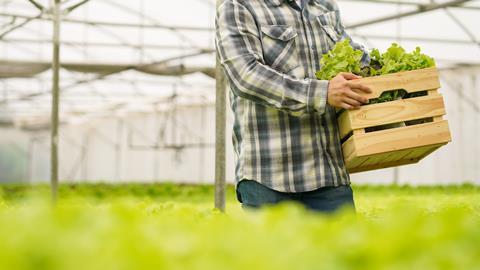UK consumers are embracing the increased variety on offer in the salad category, but the warm, dry weather is creating issues for the country’s producers, according to the British Leafy Salads Association

The 2025 season for leafy salads in the UK has been dominated by the issue of increased pest activity, the result of prolonged warm, dry weather across the country, bringing unprecedented numbers of both pests and beneficial insects.
According to the British Leafy Salads Association (BLSA), aphids, particularly Nasonovia ribisnigri (Nas) and Myzus persicae (Myzus), have presented a serious challenge for lettuce growers.
“Despite robust efforts across the sector, infestations have rendered substantial volumes of crop unmarketable,” the BLSA stated. “Produce has been rejected at various points in the supply chain where it has failed to meet specifications, and there has been an increase in customer complaints at retail level.
“While similar pest trends have been reported across Europe, the consequences for UK lettuce production this year have been particularly severe. The combination of conducive weather conditions and limited control measures has left growers with few effective options to prevent or mitigate losses.”
According to the BLSA, the cumulative effect has placed “additional strain on a sector already under pressure from high input costs, tight margins and climatic variability”.
A collaborative effort is underway to understand the scale of the challenge and identify solutions, with the BLSA coordinating activity across growers, breeders, researchers and policymakers.
“We’ve found it a challenge,” conceded Marion Regan, managing director of Kent-based producer LJ Betts. “There aren’t the tools in the toolbox to deal with this problem.”
The dry conditions have at least facilitated cropping and the preparation of the soil and cover crops. “Harvesting has been pretty straightforward as a consequence of the dry summer, and the demand has been good thanks to the nice weather,” said Regan. “And availability of leafy salads has been good too.”
Along with such challenges has come innovation, both in terms of new varieties that offer greater resistance and in terms of leaf shape, colour, flavour and mix creation for greater appeal.
According to Regan, innovation is also coming from chefs and influencers. “Salads are a highly photogenic product – you can do lots of fun things with leaves,” she pointed out. “We also produce berries, and we’ve had a lot of interest in mixes of things like spinach and strawberry, and rocket and blackberry.”
The BLSA said that high late-season aphid populations raise concerns about overwintering and the potential for “similarly severe pressure” in 2026. “While it is too early to predict next season’s conditions, the sector recognises the importance of taking proactive steps now to strengthen future resilience,” it stated.



